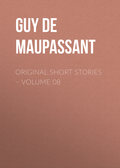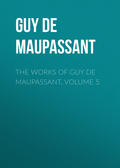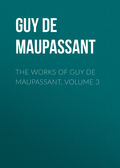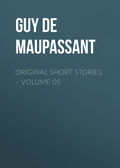
Ги де Мопассан
Complete Original Short Stories of Guy De Maupassant
“Schopenhauer, gentlemen, Schopenhauer, the great philosopher, revered by all Germany, says: ‘Man’s intelligence must have been terribly deadened by love in order to call this sex with the small waist, narrow shoulders, large hips and crooked legs, the fair sex. All its beauty lies in the instinct of love. Instead of calling it the fair, it would have been better to call it the unaesthetic sex. Women have neither the appreciation nor the knowledge of music, any more than they have of poetry or of the plastic arts; with them it is merely an apelike imitation, pure pretence, affectation cultivated from their desire to please.’”
“The man who said that is an idiot,” exclaimed Monsieur de Sombreterre.
Monsieur Rade smilingly continued:
“And how about Rousseau, gentlemen? Here is his opinion: ‘Women, as a rule, love no art, are skilled in none, and have no talent.’”
Monsieur de Sombreterre disdainfully shrugged his shoulders:
“Then Rousseau is as much of a fool as the other, that’s all.”
Monsieur Rade, still smiling, went on:
“And this is what Lord Byron said, who, nevertheless, loved women: ‘They should be well fed and well dressed, but not allowed to mingle with society. They should also be taught religion, but they should ignore poetry and politics, only being allowed to read religious works or cook-books.’”
Monsieur Rade continued:
“You see, gentlemen, all of them study painting and music. But not a single one of them has ever painted a remarkable picture or composed a great opera! Why, gentlemen? Because they are the ‘sexes sequior’, the secondary sex in every sense of the word, made to be kept apart, in the background.”
Monsieur Patissot was growing angry, and exclaimed:
“And how about Madame Sand, monsieur?”
“She is the one exception, monsieur, the one exception. I will quote to you another passage from another great philosopher, this one an Englishman, Herbert Spencer. Here is what he says: ‘Each sex is capable, under the influence of abnormal stimulation, of manifesting faculties ordinarily reserved for the other one. Thus, for instance, in extreme cases a special excitement may cause the breasts of men to give milk; children deprived of their mothers have often thus been saved in time of famine. Nevertheless, we do not place this faculty of giving milk among the male attributes. It is the same with female intelligence, which, in certain cases, will give superior products, but which is not to be considered in an estimate of the feminine nature as a social factor.’”
All Monsieur Patissot’s chivalric instincts were wounded and he declared:
“You are not a Frenchman, monsieur. French gallantry is a form of patriotism.”
Monsieur Rade retorted:
“I have very little patriotism, monsieur, as little as I can get along with.”
A coolness settled over the company, but he continued quietly:
“Do you admit with me that war is a barbarous thing; that this custom of killing off people constitutes a condition of savagery; that it is odious, when life is the only real good, to see governments, whose duty is to protect the lives of their subjects, persistently looking for means of destruction? Am I not right? Well, if war is a terrible thing, what about patriotism, which is the idea at the base of it? When a murderer kills he has a fixed idea; it is to steal. When a good man sticks his bayonet through another good man, father of a family, or, perhaps, a great artist, what idea is he following out?”
Everybody was shocked.
“When one has such thoughts, one should not express them in public.”
M. Patissot continued:
“There are, however, monsieur, principles which all good people recognize.”
M. Rade asked: “Which ones?”
Then very solemnly, M. Patissot pronounced: “Morality, monsieur.”
M. Rade was beaming; he exclaimed:
“Just let me give you one example, gentlemen, one little example. What is your opinion of the gentlemen with the silk caps who thrive along the boulevard’s on the delightful traffic which you know, and who make a living out of it?”
A look of disgust ran round the table:
“Well, gentlemen! only a century ago, when an elegant gentleman, very ticklish about his honor, had for – friend – a beautiful and rich lady, it was considered perfectly proper to live at her expense and even to squander her whole fortune. This game was considered delightful. This only goes to show that the principles of morality are by no means settled – and that – ”
M. Perdrix, visibly embarrassed, stopped him:
“M. Rade, you are sapping the very foundations of society. One must always have principles. Thus, in politics, here is M. de Sombreterre, who is a Legitimist; M. Vallin, an Orleanist; M. Patissot and myself, Republicans; we all have very different principles, and yet we agree very well because we have them.”
But M. Rade exclaimed:
“I also have principles, gentlemen, very distinct ones.”
M. Patissot raised his head and coldly asked:
“It would please me greatly to know them, monsieur.”
M. Rade did not need to be coaxed.
“Here they are, monsieur:
“First principle – Government by one person is a monstrosity.
“Second principle – Restricted suffrage is an injustice.
“Third principle – Universal suffrage is idiotic.
“To deliver up millions of men, superior minds, scientists, even geniuses, to the caprice and will of a being who, in an instant of gaiety, madness, intoxication or love, would not hesitate to sacrifice everything for his exalted fancy, would spend the wealth of the country amassed by others with difficulty, would have thousands of men slaughtered on the battle-fields, all this appears to me – a simple logician – a monstrous aberration.
“But, admitting that a country must govern itself, to exclude, on some always debatable pretext, a part of the citizens from the administration of affairs is such an injustice that it seems to me unworthy of a further discussion.
“There remains universal suffrage. I suppose that you will agree with me that geniuses are a rarity. Let us be liberal and say that there are at present five in France. Now, let us add, perhaps, two hundred men with a decided talent, one thousand others possessing various talents, and ten thousand superior intellects. This is a staff of eleven thousand two hundred and five minds. After that you have the army of mediocrities followed by the multitude of fools. As the mediocrities and the fools always form the immense majority, it is impossible for them to elect an intelligent government.
“In order to be fair I admit that logically universal suffrage seems to me the only admissible principle, but it is impracticable. Here are the reasons why:
“To make all the living forces of the country cooperate in the government, to represent all the interests, to take into account all the rights, is an ideal dream, but hardly practicable, because the only force which can be measured is that very one which should be neglected, the stupid strength of numbers, According to your method, unintelligent numbers equal genius, knowledge, learning, wealth and industry. When you are able to give to a member of the Institute ten thousand votes to a ragman’s one, one hundred votes for a great land-owner as against his farmer’s ten, then you will have approached an equilibrium of forces and obtained a national representation which will really represent the strength of the nation. But I challenge you to do it.
“Here are my conclusions:
“Formerly, when a man was a failure at every other profession he turned photographer; now he has himself elected a deputy. A government thus composed will always be sadly lacking, incapable of evil as well as of good. On the other hand, a despot, if he be stupid, can do a lot of harm, and, if he be intelligent (a thing which is very scarce), he may do good.
“I cannot decide between these two forms of government; I declare myself to be an anarchist, that is to say, a partisan of that power which is the most unassuming, the least felt, the most liberal, in the broadest sense of the word, and revolutionary at the same time; by that I mean the everlasting enemy of this same power, which can in no way be anything but defective. That’s all!”
Cries of indignation rose about the table, and all, whether Legitimist, Orleanist or Republican through force of circumstances, grew red with anger. M. Patissot especially was choking with rage, and, turning toward M. Rade, he cried:
“Then, monsieur, you believe in nothing?”
The other answered quietly:
“You’re absolutely correct, monsieur.”
The anger felt by all the guests prevented M. Rade from continuing, and M. Perdrix, as chief, closed the discussion.
“Enough, gentlemen! We each have our opinion, and we have no intention of changing it.”
All agreed with the wise words. But M. Rade, never satisfied, wished to have the last word.
“I have, however, one moral,” said he. “It is simple and always applicable. One sentence embraces the whole thought; here it is: ‘Never do unto another that which you would not have him do unto you.’ I defy you to pick any flaw in it, while I will undertake to demolish your most sacred principles with three arguments.”
This time there was no answer. But as they were going home at night, by couples, each one was saying to his companion: “Really, M. Rade goes much too far. His mind must surely be unbalanced. He ought to be appointed assistant chief at the Charenton Asylum.”
A RECOLLECTION
How many recollections of youth come to me in the soft sunlight of early spring! It was an age when all was pleasant, cheerful, charming, intoxicating. How exquisite are the remembrances of those old springtimes!
Do you recall, old friends and brothers, those happy years when life was nothing but a triumph and an occasion for mirth? Do you recall the days of wanderings around Paris, our jolly poverty, our walks in the fresh, green woods, our drinks in the wine-shops on the banks of the Seine and our commonplace and delightful little flirtations?
I will tell you about one of these. It was twelve years ago and already appears to me so old, so old that it seems now as if it belonged to the other end of life, before middle age, this dreadful middle age from which I suddenly perceived the end of the journey.
I was then twenty-five. I had just come to Paris. I was in a government office, and Sundays were to me like unusual festivals, full of exuberant happiness, although nothing remarkable occurred.
Now it is Sunday every day, but I regret the time when I had only one Sunday in the week. How enjoyable it was! I had six francs to spend!
On this particular morning I awoke with that sense of freedom that all clerks know so well – the sense of emancipation, of rest, of quiet and of independence.
I opened my window. The weather was charming. A blue sky full of sunlight and swallows spread above the town.
I dressed quickly and set out, intending to spend the day in the woods breathing the air of the green trees, for I am originally a rustic, having been brought up amid the grass and the trees.
Paris was astir and happy in the warmth and the light. The front of the houses was bathed in sunlight, the janitress’ canaries were singing in their cages and there was an air of gaiety in the streets, in the faces of the inhabitants, lighting them up with a smile as if all beings and all things experienced a secret satisfaction at the rising of the brilliant sun.
I walked towards the Seine to take the Swallow, which would land me at Saint-Cloud.
How I loved waiting for the boat on the wharf:
It seemed to me that I was about to set out for the ends of the world, for new and wonderful lands. I saw the boat approaching yonder, yonder under the second bridge, looking quite small with its plume of smoke, then growing larger and ever larger, as it drew near, until it looked to me like a mail steamer.
It came up to the wharf and I went on board. People were there already in their Sunday clothes, startling toilettes, gaudy ribbons and bright scarlet designs. I took up a position in the bows, standing up and looking at the quays, the trees, the houses and the bridges disappearing behind us. And suddenly I perceived the great viaduct of Point du Jour which blocked the river. It was the end of Paris, the beginning of the country, and behind the double row of arches the Seine, suddenly spreading out as though it had regained space and liberty, became all at once the peaceful river which flows through the plains, alongside the wooded hills, amid the meadows, along the edge of the forests.
After passing between two islands the Swallow went round a curved verdant slope dotted with white houses. A voice called out: “Bas Meudon” and a little further on, “Sevres,” and still further, “Saint-Cloud.”
I went on shore and walked hurriedly through the little town to the road leading to the wood.
I had brought with me a map of the environs of Paris, so that I might not lose my way amid the paths which cross in every direction these little forests where Parisians take their outings.
As soon as I was unperceived I began to study my guide, which seemed to be perfectly clear. I was to turn to the right, then to the left, then again to the left and I should reach Versailles by evening in time for dinner.
I walked slowly beneath the young leaves, drinking in the air, fragrant with the odor of young buds and sap. I sauntered along, forgetful of musty papers, of the offices, of my chief, my colleagues, my documents, and thinking of the good things that were sure to come to me, of all the veiled unknown contained in the future. A thousand recollections of childhood came over me, awakened by these country odors, and I walked along, permeated with the fragrant, living enchantment, the emotional enchantment of the woods warmed by the sun of June.
At times I sat down to look at all sorts of little flowers growing on a bank, with the names of which I was familiar. I recognized them all just as if they were the ones I had seen long ago in the country. They were yellow, red, violet, delicate, dainty, perched on long stems or close to the ground. Insects of all colors and shapes, short, long, of peculiar form, frightful, and microscopic monsters, climbed quietly up the stalks of grass which bent beneath their weight.
Then I went to sleep for some hours in a hollow and started off again, refreshed by my doze.
In front of me lay an enchanting pathway and through its somewhat scanty foliage the sun poured down drops of light on the marguerites which grew there. It stretched out interminably, quiet and deserted, save for an occasional big wasp, who would stop buzzing now and then to sip from a flower, and then continue his way.
All at once I perceived at the end of the path two persons, a man and a woman, coming towards me. Annoyed at being disturbed in my quiet walk, I was about to dive into the thicket, when I thought I heard someone calling me. The woman was, in fact, shaking her parasol, and the man, in his shirt sleeves, his coat over one arm, was waving the other as a signal of distress.
I went towards them. They were walking hurriedly, their faces very red, she with short, quick steps and he with long strides. They both looked annoyed and fatigued.
The woman asked:
“Can you tell me, monsieur, where we are? My fool of a husband made us lose our way, although he pretended he knew the country perfectly.”
I replied confidently:
“Madame, you are going towards Saint-Cloud and turning your back on Versailles.”
With a look of annoyed pity for her husband, she exclaimed:
“What, we are turning our back on Versailles? Why, that is just where we want to dine!”
“I am going there also, madame.”
“Mon Dieu, mon Dieu, mon Dieu!” she repeated, shrugging her shoulders, and in that tone of sovereign contempt assumed by women to express their exasperation.
She was quite young, pretty, a brunette with a slight shadow on her upper lip.
As for him, he was perspiring and wiping his forehead. It was assuredly a little Parisian bourgeois couple. The man seemed cast down, exhausted and distressed.
“But, my dear friend, it was you – ” he murmured.
She did not allow him to finish his sentence.
“It was I! Ah, it is my fault now! Was it I who wanted to go out without getting any information, pretending that I knew how to find my way? Was it I who wanted to take the road to the right on top of the hill, insisting that I recognized the road? Was it I who undertook to take charge of Cachou – ”
She had not finished speaking when her husband, as if he had suddenly gone crazy, gave a piercing scream, a long, wild cry that could not be described in any language, but which sounded like ‘tuituit’.
The young woman did not appear to be surprised or moved and resumed:
“No, really, some people are so stupid and they pretend they know everything. Was it I who took the train to Dieppe last year instead of the train to Havre – tell me, was it I? Was it I who bet that M. Letourneur lived in Rue des Martyres? Was it I who would not believe that Celeste was a thief?”
She went on, furious, with a surprising flow of language, accumulating the most varied, the most unexpected and the most overwhelming accusations drawn from the intimate relations of their daily life, reproaching her husband for all his actions, all his ideas, all his habits, all his enterprises, all his efforts, for his life from the time of their marriage up to the present time.
He strove to check her, to calm her and stammered:
“But, my dear, it is useless – before monsieur. We are making ourselves ridiculous. This does not interest monsieur.”
And he cast mournful glances into the thicket as though he sought to sound its peaceful and mysterious depths, in order to flee thither, to escape and hide from all eyes, and from time to time he uttered a fresh scream, a prolonged and shrill “tuituit.” I took this to be a nervous affection.
The young woman, suddenly turning towards me: and changing her tone with singular rapidity, said:
“If monsieur will kindly allow us, we will accompany him on the road, so as not to lose our way again, and be obliged, possibly, to sleep in the wood.”
I bowed. She took my arm and began to talk about a thousand things – about herself, her life, her family, her business. They were glovers in the Rue, Saint-Lazare.
Her husband walked beside her, casting wild glances into the thick wood and screaming “tuituit” every few moments.
At last I inquired:
“Why do you scream like that?”
“I have lost my poor dog,” he replied in a tone of discouragement and despair.
“How is that – you have lost your dog?”
“Yes. He was just a year old. He had never been outside the shop. I wanted to take him to have a run in the woods. He had never seen the grass nor the leaves and he was almost wild. He began to run about and bark and he disappeared in the wood. I must also add that he was greatly afraid of the train. That may have driven him mad. I kept on calling him, but he has not come back. He will die of hunger in there.”
Without turning towards her husband, the young woman said:
“If you had left his chain on, it would not have happened. When people are as stupid as you are they do not keep a dog.”
“But, my dear, it was you – ” he murmured timidly.
She stopped short, and looking into his eyes as if she were going to tear them out, she began again to cast in his face innumerable reproaches.
It was growing dark. The cloud of vapor that covers the country at dusk was slowly rising and there was a poetry in the air, induced by the peculiar and enchanting freshness of the atmosphere that one feels in the woods at nightfall.
Suddenly the young man stopped, and feeling his body feverishly, exclaimed:
“Oh, I think that I – ”
She looked at him.
“Well, what?”
“I did not notice that I had my coat on my arm.”
“Well – ?”
“I have lost my pocketbook – my money was in it.”
She shook with anger and choked with indignation.
“That was all that was lacking. How stupid you are! how stupid you are! Is it possible that I could have married such an idiot! Well, go and look for it, and see that you find it. I am going on to Versailles with monsieur. I do not want to sleep in the wood.”
“Yes, my dear,” he replied gently. “Where shall I find you?”
A restaurant had been recommended to me. I gave him the address.
He turned back and, stooping down as he searched the ground with anxious eyes, he moved away, screaming “tuituit” every few moments.
We could see him for some time until the growing darkness concealed all but his outline, but we heard his mournful “tuituit,” shriller and shriller as the night grew darker.
As for me, I stepped along quickly and happily in the soft twilight, with this little unknown woman leaning on my arm. I tried to say pretty things to her, but could think of nothing. I remained silent, disturbed, enchanted.
Our path was suddenly crossed by a high road. To the right I perceived a town lying in a valley.
What was this place? A man was passing. I asked him. He replied:
“Bougival.”
I was dumfounded.
“What, Bougival? Are you sure?”
“Parbleu, I belong there!”
The little woman burst into an idiotic laugh.
I proposed that we should take a carriage and drive to Versailles. She replied:
“No, indeed. This is very funny and I am very hungry. I am really quite calm. My husband will find his way all right. It is a treat to me to be rid of him for a few hours.”
We went into a restaurant beside the water and I ventured to ask for a private compartment. We had some supper. She sang, drank champagne, committed all sorts of follies.
That was my first serious flirtation.







